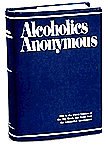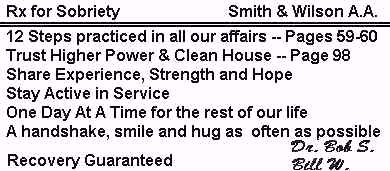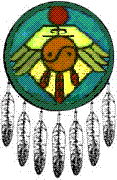

 Click The Images To Go To Page Indicated In The Flag The Big Book of AA, Alcoholics Anonymous, was first published in 1939. A revised 2nd edition was published in 1955. Twelve years later, in the July 1967 AA Grapevine, began an exciting new series of articles - "Big Book Stories - Updated." ... "The Professor and the Paradox" only appeared in the 2nd Editon. The Professor, John Parr, from a vantage of another dozen years sobriety, reflects on why he became alcoholic and why AA works for him. MIRACULOUS IS THE WORD I have tried hard not to be proud that my little narrative - "The Professor and the Paradox" - was included among the Personal Stories in the Revised (1955) Second Edition of the Big Book. Whenever I get too puffed up about it, I usually remind myself of an appropriate AA story I have told on several occasions. It concerns a young Canadian priest who was serving his church in northeast Canada, travelling about on snowshoes and dog sled, covering a territory about twice the size of Texas, and ministering to a total population of about twenty-eight people. After five years of this, his headquarters in Montreal decided he needed a short rest, and he was accordingly called home for a mild celebration. At the welcome banquet given in his honor when he arrived in Montreal, the master of ceremonies of course praised the young priest highly, and apparently overdid it. For later in the evening when the banquet was over and the young priest had retired to his room, he was overheard saying his prayers. Here is what he was saying: "Dear Lord, please keep me humble, because I am a very great man." There is at least one disadvantage in having one's story in the Big Book. Most of us in AA have basically only one story, and that one in the Big Book is mine. As the evening's speaker, before and since the revised Edition was published, I have delivered that speech more or less word for word to many groups in many places, particularly in my own and a few neighboring states. Once, after I had thus delivered it as part of a program at an AA State Convention out west where I was virtually unknown, I was standing alone among the crowd in the lobby of the convention auditorium and happened to overhear one man telling another about me, "That last speaker was a liar and a thief and a fake. He stole every word he said right out of a story printed in the Big Book!" In the rush of the crowd I never saw him again or got a chance to correct him as to my character. In my original account of myself I described my advent into AA as a happening brought about by some forces at work that I did not - and still do not - understand. I knew only that something happened to me that had never happened before. At one time I thought I had simply made a decision instead of a mere alcoholic promise, but I discarded that idea in favor of assigning the cause to the guiding hand of God, following by my own attempt to take the Twelve Steps to Recovery. I ended by saying that "whatever it was that brought me in, I have been in AA and I have been dry ever since." Very fortunately, I can still say so. I have often wondered why - precisely and exactly why - I got myself into the horrible alcoholic condition I was in when I joined our AA group. I am not sure that I have discovered this yet. Of course, the alcoholic has been variously and diversely defined. It has even been suggested that he simply does not know what he really wants, or always wants something that he doesn't have, and one of the humorous definitions of him illustrates this theory beautifully. An alcoholic (according to this definition, which I learned from a fine A.A. from Dallas) is a fellow who when he is rich wants to be poor, and when he is poor wants to be rich; when he is single he wants to be married, and when he is married he wants to be single; when he goes to a wedding he wants to be the bride; when he goes to the dinner table he wants to make love, and when he goes to bed he wants to eat! But let us be serious. It is now generally recognized that alcoholism is a symptom of some deep-seated maladjustment of one's personality, a symptom of some emotional conflict which one has been unable to solve. For example, in my case (perhaps not in yours, but at any rate in mine), I am a self-centered person, very egotistical, and quite unreasonable in my demands upon other people (either actually or in my thoughts about them). I became so self-centered that I withdrew myself into a small circle which got smaller and smaller until there was no one in it but myself. There was no real company there except my bottle. Next, I am "emotionally immature," which I explain as being emotionally susceptible (far beyond the normal) to resentment, envy, fear, anxiety and grandiose day-dreaming. (Most alcoholics I know well are extremely affected by one or more or all five of these.) Then, I tried hard to be a perfectionist, and failed, of course, to advance to anything even remotely perfect. Finally, I was running away from something - perhaps from the reality of my situation. These (self-centeredness, emotional immaturity, striving for perfection and running away), I think, are the chief personality traits which play havoc with the alcoholic's way of living. At least they seemed to do so with me. And they are difficult traits to get rid of. I haven't got rid of mine yet, but I have improved. I have improved to the extent that I no longer have to take a drink or a pill to overcome them. Do not ever let anybody tell you that the AA program is easy to make. It isn't. That I am unmanageable and have personality weaknesses or shortcomings which can lead me to disaster was to me most unreasonable. It was very difficult for me to realize that the Twelve Steps, which looked so na´ve at first, would succeed better than all my well-thought-out methods. That I was powerless over anything was a bitter pill to swallow. It was hard for me to keep "an open mind" or do my part to let others "live." It took a "bottom" of considerable crisis to reduce me to personal helplessness so acute that I was ready for humility and surrender. And all of this was not attained by me by my simply walking into an AA meeting place. The AA program and procedure has worked well for me and for a tremendous number of other people. Why does it work when other things fail? We don't know. We really don't know. We do have a lot of ideas. We know a great deal about drinking - its pleasure as well as its tragedies, its humorous side, the flimsy alibis, the hiding places, the degradation and helplessness of alcoholic's victims. Nevertheless, we don't really know precisely why AA works. But we do know that we get a lot of help from continual association with our groups. We get a lot of help from the observations we can make there. We benefit from associating with excessive drinkers who stay sober, and this seems to have some sort of favorable psychological effect (so much so that one is tempted to speculate that sobriety among alcoholics is contagious). We benefit from association with excessive drinkers who do not stay sober, which seems to have favorable results too. We also sit around and take everybody else's "inventory," until the thought strikes us that we had better take our own. But above all we learn to eliminate alcoholism by doing certain things which strike at the deep-seated causes of the malady, rather than simply taking away or shutting off the whiskey. We learn to change our self-centeredness, to stop running away from things we don't like, and to remove or at least adjust our emotional shortcomings. We do these things by taking seriously and honestly our Twelve Steps, the nearest thing to a "cure" for alcoholism that anybody has yet discovered. We learn that these Steps (over a sufficient period of time) will change our attitudes, change our thinking, change our personalities (if that be possible), change the inner man or woman into something it had not been before, and change our pattern of living into one we had not enjoyed in the past. We learn to do these things not by just memorizing the Steps (though that is a good idea), but by attempting to live and act them each day of our lives. And eventually, often when we least expect it, we discover that as a result of all this we are happy and contented and full of thanksgiving - something I once knew (or thought I knew) I could never be, without drinking. Members of AA groups are full of miraculous changes like that. I am one of those fortunate ones who has had it happen to me. There are hundreds of thousands of others in AA today. J.P., Kent, Ohio Index of A.A. History Pages on Barefoot's Domain As in so many things, especially with we alcoholics, our History is our Greatest Asset!.. We each arrived at the doors of A.A. with an intensive and lengthy "History of Things That Do Not Work" .. Today, In A.A. and In Recovery, Our History has added an intensive and lengthy "History of Things That DO Work!!" and We will not regret the past nor wish to shut the door on it!!
KEEP COMING BACK!
On the Web Oct 24, 2002 in the Spirit of Cooperation Three mighty important things, Pardn'r, LOVE And PEACE and SOBRIETY |

